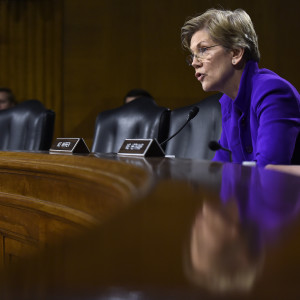Sen. Elizabeth Warren joined the progressive call for an overhaul to workers’ rights in the sharing economy during a speech Thursday in Washington, where the Massachusetts Democrat named companies like Uber and Lyft as antagonists in the fight for employee welfare in the 21st century.
While the ridesharing services have fought hard for their chance to compete against decades-old taxi monopolies in major cities across the country, Warren said they’ve fought equally hard against regulations to level the playing field between the old and new, and resisted “rules to promote rider safety and driver accountability.”
“And while their businesses provide workers with greater flexibility, companies like Lyft and Uber have often resisted efforts of those very same workers to try to access a greater share of the wealth that is generated from the work that they do,” Warren told attendees of New America’s annual conference, titled “The Next Social Contract.”
The ridesharing companies have come to represent the forefront of the “gig economy,” as well as the public face of its growing pains in recent years. Both have engaged in numerous legal battles resisting the attempts of their workers — hired as independent contractors — to claim the same benefits as full-time employees, including paid leave, insurance, tax withholding, retirement income and the ability to form unions.
Warren likened those fights to the battle for occupational safety standards and worker’s rights amid the Industrial Revolution.
“Workplaces were monstrously unsafe, wages were paltry, hours were grueling,” she said. “America’s response wasn’t to abandon technological innovations and improvements from the Industrial Revolution — we didn’t send everyone back to the farms.”
Warren said no one “entertains the idea of pulling the plug on the Internet,” but said history has proven “policy also matters” to bolstering a strong middle class.
“Instead, we came together, and through our government, we changed public policies to adapt to a changing economy to try to keep the good, and get rid of the bad,” the Massachusetts senator said.
She added the problems aren’t unique to the gig economy — it just represents the most recent “merciless attack” on workers over the last three decades.
“Long before anybody ever wrote an article about the gig economy, corporations had discovered the higher profits they could wring out of an on-demand workforce made up of independent contractors,” Warren said.
Dubbed 1099 workers after the IRS form for reporting miscellaneous income, independent contractors have little or no access to unemployment insurance, workers’ compensation and social security, which according to Warren, “means the workers who most need the safety net are the ones least likely to have it.”
She speculated the benefits of the gig economy — like working when convenient and making ends meet in a weak labor market — “might be true for some workers in some conditions,” but added “for many the gig economy is simply the next step in a losing effort to build some economic security in a world where all the benefits and wealth are floating to the top 10 percent.”
Warren’s list of fixes include universalizing workers’ comp and paid leave — including medical, family and personal — across the 1099 divide, requiring payroll deductions for disability, workers’ comp and Social Security (contractors pay in themselves, often at lower rates than their full-time counterparts, resulting in a smaller cushions), making benefits like health insurance portable from job-to-job, introducing worker-run pension plans similar to those managed by unions, giving contractors the right to organize like unions and creating narrowed definitions for worker classification.
“It’s time for all workers to have access to the same low-cost, well-protected retirement products that some employers and unions provide today,” the Massachusetts senator said.
Warren’s Republican colleagues in the upper chamber, including Florida Sen. Marco Rubio, have resisted calls for more regulation to what they paint as the frontier of the new American economy.
“The on-demand economy is a miracle that only American free enterprise could produce,” Rubio said in October. “That’s why it’s so shameful that the biggest obstacle to the growth of this platform is our very own government.”
The Florida senator said the gig economy gives workers the freedom to seek higher education and increases upward mobility by freeing disruptors like Uber from the obligation to provide costly benefits like health insurance.
He also pointed out 1099 requirements prevent companies from establishing minimum standards for service and appearance, or from providing “perks and benefits” to attract “high-quality professionals.”
“Our outdated politicians bash the on-demand economy for not taking better care of workers,” Rubio said, “Yet our outdated government is the exact force preventing it from doing so.”
Though the Federal Trade Commission has launched invenstigations into certain practices in the gig economy, FTC Commissioner Maureen Ohlhausen told companies during a workshop last year the agency has no “planned, big enforcement push” coming to the sharing space.

